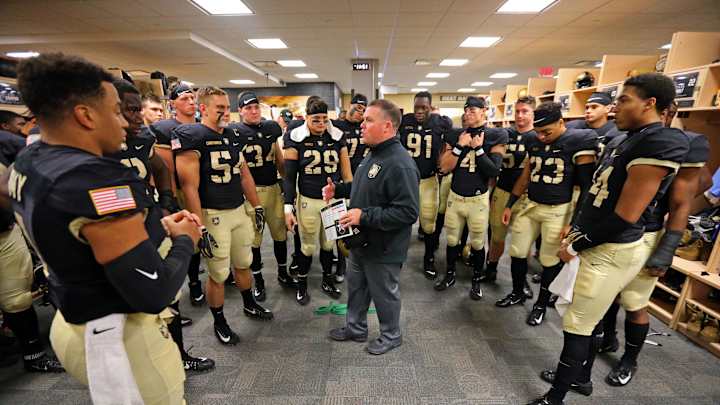How has UNC defensive coordinator Jay Bateman done more with less and what can be expected this season?

Time and again, Mack Brown saw Jay Bateman do more with less.
Their first real meeting came with the 2017 Armed Forces Bowl, when Brown was on the call as Army held San Diego State to 25 passing yards in a 42-35 victory. His fascination with Bateman grew when he spent three days at West Point, watching practice and speaking with the team.
Then came Army’s trip to Oklahoma, where the Black Knights held the Sooners to 355 total yards in a heartbreaking 28-21 overtime loss, forcing two turnovers as Heisman Trophy winner Kyler Murray passed for just 165 yards and ran for another 71.
It was the only time Oklahoma was held below 37 points during the regular season, and the Sooners still managed 34 points in their CFP semifinal loss to Alabama.
Oklahoma wound up leading the nation in total offense with an average of 570 yards and scoring at 48.4 points
“I watched them against Oklahoma and they hold them to 28 points with not having a player on the Army team that could play for Oklahoma,” Brown said.
That’s not hyperbole.
From the four years preceding his time at Army through his Bateman’s season, Army’s recruiting classes held an average recruiting ranking of 116.5 according to 247 Sports, with an 88 ranked class as the outlier among a group that ranked 113 or worse.
Yet, over five seasons, Bateman led a unit that had an average ranking of 36.4 nationally in total defense, including two that landed inside the top 10.

For all the talk about Bateman’s 3-4 scheme, the versatility he requires or all of the disguised coverages, he boiled it down to something simple.
“I tell these guys all the time, at West Point we didn’t necessarily have the most talented athletes; we had really good players,” he said. “I think being a good player and being a good athlete aren’t mutually inclusive. I think the ability to do your job, to play with great pad level, to play fundamentals, and to play with great effort and communicate, those don’t take a ton of ability.
“So, if you do that and then add in the fact that they are longer, faster guys, then you should be OK. That Army West Point defense, those kids were tough. Those jokers competed and we’re trying to get to that spot here right now.”
How ability is evaluated is an entirely different can of worms, but it’s clear that never changed much at Army because of the program’s unique restrictions and West Point’s recruiting classes landed between 117-121 in Bateman’s tenure.
So what changed, as he took a defense from 91 nationally in his first season in 2014 to eighth in 2018?
At Carolina, the emphasis to this point has been on communication. Not only are the Tar Heels in a completely new scheme, but they’re so active in terms disguising and shifting, there’s no way things would work without it.
“Communicating across the board is probably the biggest area,” senior safety Myles Dorn said. “I think it’s important in every defense but this one, just because we do so much. We mix a lot of things up, so we’ve got to get on the same page.
“We’ve got a lot of old-heads that know football, and when everybody knows football, it’s quick and easy communication.”
There’s also a familiar theme from Army that’s even more important for the Black Knights as they move into their careers after the Academy — everyone on the field has a role and a job that’s absolutely vital to the success of the mission, and one bit of doubt could jeopardize everyone.
That’s something Bateman has drilled home with the Tar Heels.
“Coach Bateman told us that his guys at army did a great job of buying into what he had going in,” junior safety Myles Wolfolk said. “I think that was it for us, we had to trust the coaching staff and what they’re bringing to us and we bought in and I think it’s going to be really nice.”
Trust will be incredibly important, based on Bateman’s history.
For all of the success his defenses have had, it’s not necessarily immediate.
In each of his past two jobs at Army and Ball State, his first-year defense has taken a step back from the season before he arrived, particularly against the pass. The Cardinals went from 59 in pass defense in 2010 to 115 in 2011 and the Black Knights went from 13 in 2013 to 85 in 2014.

In both places, his teams made major leaps in the second and third seasons, with Army’s 85 ranked pass-defense rising to 6 nationally in 2016.
Of course, Bateman has never had talent like he’ll have available at Carolina, where the past five recruiting classes have an average ranking of 27.6 with several future NFL players on the roster.
On-field communication isn’t the only thing of importance in the process of getting there. Despite his intensity, Bateman made it clear that football is to be viewed as just a game and players need to remember why they began playing in the first place.
“He challenges us in the meeting room and he challenges us on the field, but he’s also a guy, you can sit down and eat lunch with him and it’s not a problem, it’s not always football,” Dorn said. “He actually has a connection with his players.”
